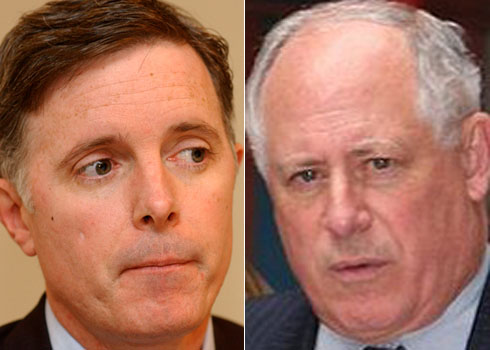The Illinois primary is now over. And with 99 percent of the precincts reporting, we have a variety of results to share with you. The primary has seen not one but two super-close statewide races — in the party primaries for the exact same office, no less — with both the Democratic and Republican gubernatorial primaries still not settled. So what comes next?
The primaries for President Obama’s former Senate seat saw clear, unambiguous wins by the two nominees. For the Democrats, state Treasurer Alexi Giannoulias beat former Chicago Inspector General David Hoffman by 39%-34%. On the Republican side, Rep. Mark Kirk beat attorney Patrick Hughes by 57%-19%. This will be a top-tier Senate contest this fall.
In House-race primaries, the most notable result was in the 14th Congressional District. The seat was held from 1987 until 2007 by Republican Dennis Hastert, who served for eight years as Speaker of the House. After Republicans lost the majority in 2006, Hastert resigned during his next term, and the seat was picked up by Democrat Bill Foster in a March 2008 special election. One of Hastert’s sons, Ethan Hastert, was running for the GOP nomination this year — and lost by 55%-45% against state Sen. Randy Hultgren.
Another top race is for the 10th District seat, currently held by GOP Senate nominee Mark Kirk. This district was carried by both John Kerry in 2004 and Barack Obama in 2008, and on paper could be a potential Democratic pick-up. It will see a contest between Republican businessman Bob Dold and Democratic candidate Dan Seals, who twice ran against Kirk in 2006 and 2008.
As for the gubernatorial races, this is where things get tricky.
With 99% of precincts reporting, incumbent Democratic Gov. Pat Quinn has a lead of only about 7,087 votes against state Comptroller Dan Hynes. Quinn became governor in January 2009, after the impeachment and removal of Gov. Rod Blagojevich. On the Republican side, a six-way race has given us a result in which the winner will only have about 20% of the vote. With 99% of precincts reporting, state Sen. Bill Brady leads state Sen. Kirk Dillard by 751 votes. (Republican Adam Andrzejewski, who had a brief boomlet as a Tea Party activist candidate, got 14% of the vote, and was in fifth place.)
Quinn has claimed victory on the Democratic side, but Hynes is not conceding. “If democracy means anything,” Hynes told supporters last night, “it means we have to count all the votes.” On the Republican side, Brady has been sounding optimistic, but Dillard is still predicting victory.
Having done some research on the state election laws and media reports, and spoken to a state elections official, it needs to be noted first off that Illinois does not have an automatic statewide recount (such as we saw in Minnesota a year ago). Instead, a candidate who is on the losing end must take affirmative steps to contest an election result.
One thing a candidate can do is file for a process called a “discovery recount,” in which they pay a fee to the state to recount up to 25% of the total precincts, on a basis of that candidate having selected the specific precincts, which in this case could add up to a total of 2,803 precincts. Evidence gathered in a discovery recount can be used to dispute the election result. The candidate must pay a fee of $10 per recounted precinct.
As for the contest itself, a candidate must file with the state Supreme Court specific evidence of mistakes or fraud, which they believe will show that they are the true winner of the race. It does not appear that a discovery recount is legally necessary in order to file a contest, though any evidence gathered in a discovery recount could be beneficial in building a case.
Another important factor: A recount could not even begin for at least another month.
What all of this adds up to is that a recount here appears to have a lot more barriers than we saw in Minnesota. It would be much more difficult for a candidate who is down in the votes to get a recount, and could be even more difficult to win if the race were to go to a recount. If the process goes on past the continued vote-counting of the next few days, there would exist a clear potential for either party to end up being even more seriously divided than they already are.






